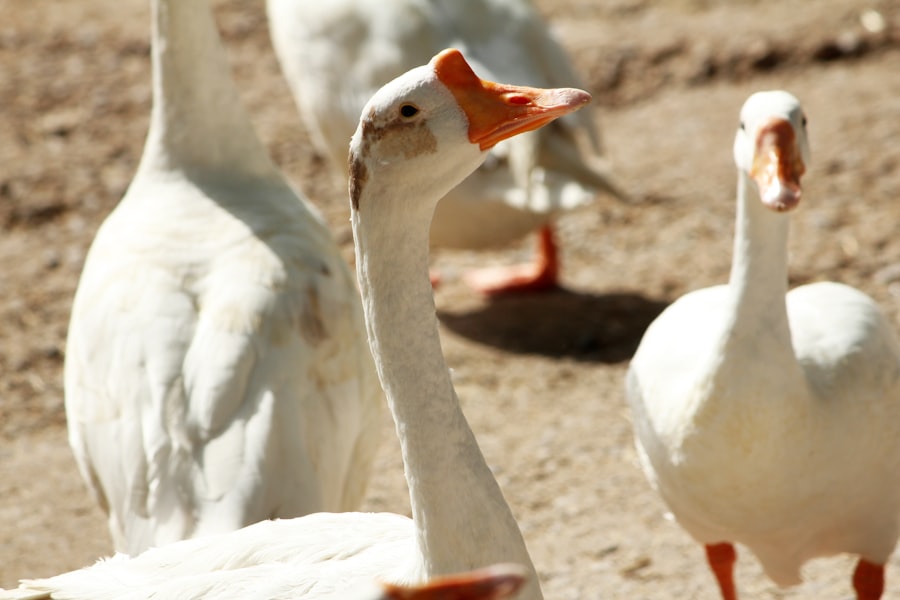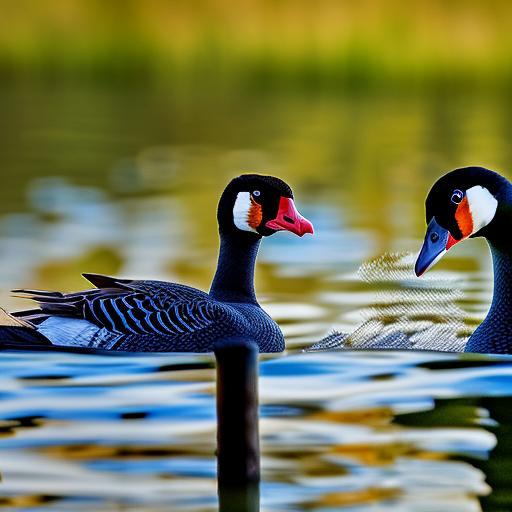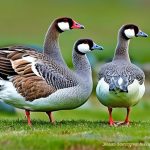Geese can be a common nuisance around docks, causing damage and leaving behind droppings that can be unsightly and unsanitary. Finding effective deterrents to keep geese away from docks is essential for maintaining a clean and safe environment. In this article, we will explore various methods to deter geese from docks, including physical barriers, decoys, sound-based deterrents, removing food sources, motion-activated sprinklers, scent-based deterrents, planting vegetation that geese dislike, applying non-toxic repellents, and seeking professional help.
Key Takeaways
- Geese are social animals and tend to gather in large groups.
- Physical barriers such as fencing or netting can prevent geese from accessing your dock.
- Decoys and other visual deterrents like balloons or flags can scare geese away.
- Sound-based deterrents like loud noises or predator calls can also be effective.
- Removing food sources near your dock can discourage geese from sticking around.
Understanding the behavior of geese
To effectively deter geese from docks, it is important to understand their behavior. Geese are attracted to docks because they provide a safe and elevated platform for nesting and resting. They are also drawn to the water surrounding the docks as a source of food. Geese are territorial birds and will defend their nesting sites aggressively. Understanding their nesting habits and territorial behavior can help in implementing effective deterrents.
Geese typically nest on the ground near water bodies, including docks. They prefer open areas with good visibility to spot potential predators. Geese are known to return to the same nesting sites year after year, so once they have established a nesting site near a dock, they are likely to return in subsequent years. This makes it important to deter them early on before they become accustomed to the dock as a nesting site.
Creating a physical barrier around your dock
One effective method of deterring geese from docks is by creating a physical barrier. This can be done using netting or fencing. Netting can be installed around the perimeter of the dock to prevent geese from accessing it. It is important to ensure that the netting is securely fastened and extends all the way to the ground to prevent geese from slipping underneath.
Fencing can also be used as a physical barrier. A fence with small gaps or holes can be effective in keeping geese away. The fence should be at least three feet high to prevent geese from jumping over it. It is important to regularly inspect the fence for any damage or gaps that may allow geese to enter.
When installing a physical barrier, it is important to consider the aesthetics and functionality of the dock. The barrier should be secure and effective in deterring geese, but it should also blend in with the surroundings and not obstruct the view or access to the dock.
Using decoys and other visual deterrents
Decoys can be an effective method of deterring geese from docks. Fake predators, such as coyotes or swans, can be placed near the dock to create the illusion of danger. Geese are naturally wary of predators and will avoid areas where they perceive a threat. Decoys should be moved periodically to prevent geese from becoming accustomed to their presence.
In addition to decoys, other visual deterrents can also be used. Reflective tape or balloons can be hung near the dock to create movement and scare geese away. These visual deterrents can be effective in deterring geese, especially when used in combination with other methods.
Implementing sound-based deterrents
Sound-based deterrents can be an effective way to deter geese from docks. Loud noises or predator calls can be used to create a sense of danger and scare geese away. There are various types of sound-based deterrents available, including motion-activated devices that emit loud noises when geese approach.
It is important to consider the volume and frequency of the sound-based deterrents to ensure they are effective without causing excessive noise pollution. Sound-based deterrents should also be used strategically, moving them periodically to prevent geese from becoming accustomed to the sounds.
Removing food sources near your dock

One of the reasons geese are attracted to docks is the availability of food sources. Removing these food sources can help deter geese from the area. Geese are attracted to grassy areas near water bodies, as they feed on grass and other vegetation. Regularly mowing the grass near the dock can help discourage geese from feeding in the area.
It is also important to remove any spilled or leftover food that may attract geese. This includes cleaning up any food scraps or crumbs left behind by humans or other animals. By removing these food sources, geese will be less likely to frequent the area.
Installing motion-activated sprinklers
Motion-activated sprinklers can be an effective method of deterring geese from docks. These sprinklers are triggered by motion and spray a burst of water when geese approach. The sudden spray of water startles the geese and encourages them to leave the area.
When installing motion-activated sprinklers, it is important to position them strategically to cover the areas where geese are likely to gather. The sprinklers should be set to activate during the times when geese are most active, such as early morning or late afternoon.
Using scent-based deterrents
Scent-based deterrents can be an effective way to deter geese from docks. Geese have a strong sense of smell and are sensitive to certain scents. Predator urine or citrus scents can be used to create a scent barrier that repels geese.
Predator urine can be purchased from garden supply stores and applied around the perimeter of the dock. Citrus scents, such as orange or lemon, can also be effective in deterring geese. These scents can be applied using sprays or diffusers.
It is important to regularly reapply scent-based deterrents, as their effectiveness may diminish over time. It is also important to consider the potential impact of these scents on other wildlife or humans in the area.
Planting vegetation that geese dislike
Planting vegetation that geese dislike can be an effective long-term solution for deterring geese from docks. Geese prefer open areas with short grass, so planting tall grasses or shrubs can make the area less attractive to them. Native plants that are not palatable to geese can also be planted to discourage their presence.
When planting vegetation, it is important to consider the specific needs and preferences of geese. Researching the types of plants that geese dislike and consulting with local experts can help in selecting the most appropriate vegetation for deterring geese.
Regular maintenance of the vegetation is also important to ensure its effectiveness. This includes pruning, weeding, and watering as needed to keep the plants healthy and thriving.
Applying non-toxic repellents
Non-toxic repellents can be an effective method of deterring geese from docks without causing harm to the birds or the environment. Grape extract or capsaicin can be applied to the dock or surrounding areas to create a taste deterrent that repels geese.
These repellents should be applied according to the manufacturer’s instructions and reapplied as needed. It is important to consider the potential impact of these repellents on other wildlife or humans in the area.
Seeking professional help for persistent geese problems
In some cases, persistent geese problems may require professional help. If other deterrent methods have been unsuccessful or if the geese population is particularly large, it may be necessary to seek assistance from professionals who specialize in wildlife management.
There are various types of professionals that can help with geese problems, including wildlife control companies, pest control companies, and environmental consultants. These professionals have the knowledge and experience to assess the situation and implement effective deterrent strategies.
Detering geese from docks can be a challenging task, but with the right methods and strategies, it is possible to create a safe and clean environment. By understanding the behavior of geese and implementing a combination of physical barriers, decoys, sound-based deterrents, removing food sources, motion-activated sprinklers, scent-based deterrents, planting vegetation that geese dislike, applying non-toxic repellents, and seeking professional help when needed, it is possible to effectively deter geese from docks. It may take some trial and error to find the methods that work best for your situation, but with persistence and patience, you can successfully keep geese away from your dock.
If you’re interested in learning more about keeping chickens, you might find this article on “What Kind of Coop is Best for Chickens?” helpful. It provides valuable insights into choosing the right coop for your feathered friends, taking into consideration factors such as size, design, and materials. Whether you’re a beginner or an experienced chicken keeper, having a suitable coop is essential for the health and well-being of your flock. Check out the article here to ensure you provide your chickens with a comfortable and secure home.
FAQs
What are some common problems caused by geese on docks?
Geese can cause a variety of problems on docks, including leaving droppings that can be slippery and unsanitary, damaging dock materials with their sharp claws, and creating noise and disturbance for dock users.
What are some natural ways to keep geese off your dock?
Some natural ways to keep geese off your dock include planting tall grasses or shrubs around the perimeter of the dock, using decoys or scare tactics such as reflective tape or balloons, and installing motion-activated sprinklers or noise-making devices.
What are some non-natural ways to keep geese off your dock?
Non-natural ways to keep geese off your dock include using chemical repellents, installing physical barriers such as netting or spikes, and hiring professional wildlife control services.
Are there any legal restrictions on how to keep geese off your dock?
Yes, there may be legal restrictions on how to keep geese off your dock depending on your location and the methods used. It is important to check with local wildlife authorities and follow any regulations or guidelines.
What should I do if I encounter an injured or sick goose on my dock?
If you encounter an injured or sick goose on your dock, it is important to contact a local wildlife rehabilitation center or animal control agency for assistance. Do not attempt to handle or move the goose yourself, as this can cause further harm to the animal and put you at risk of injury.
Meet Walter, the feathered-friend fanatic of Florida! Nestled in the sunshine state, Walter struts through life with his feathered companions, clucking his way to happiness. With a coop that’s fancier than a five-star hotel, he’s the Don Juan of the chicken world. When he’s not teaching his hens to do the cha-cha, you’ll find him in a heated debate with his prized rooster, Sir Clucks-a-Lot. Walter’s poultry passion is no yolk; he’s the sunny-side-up guy you never knew you needed in your flock of friends!







